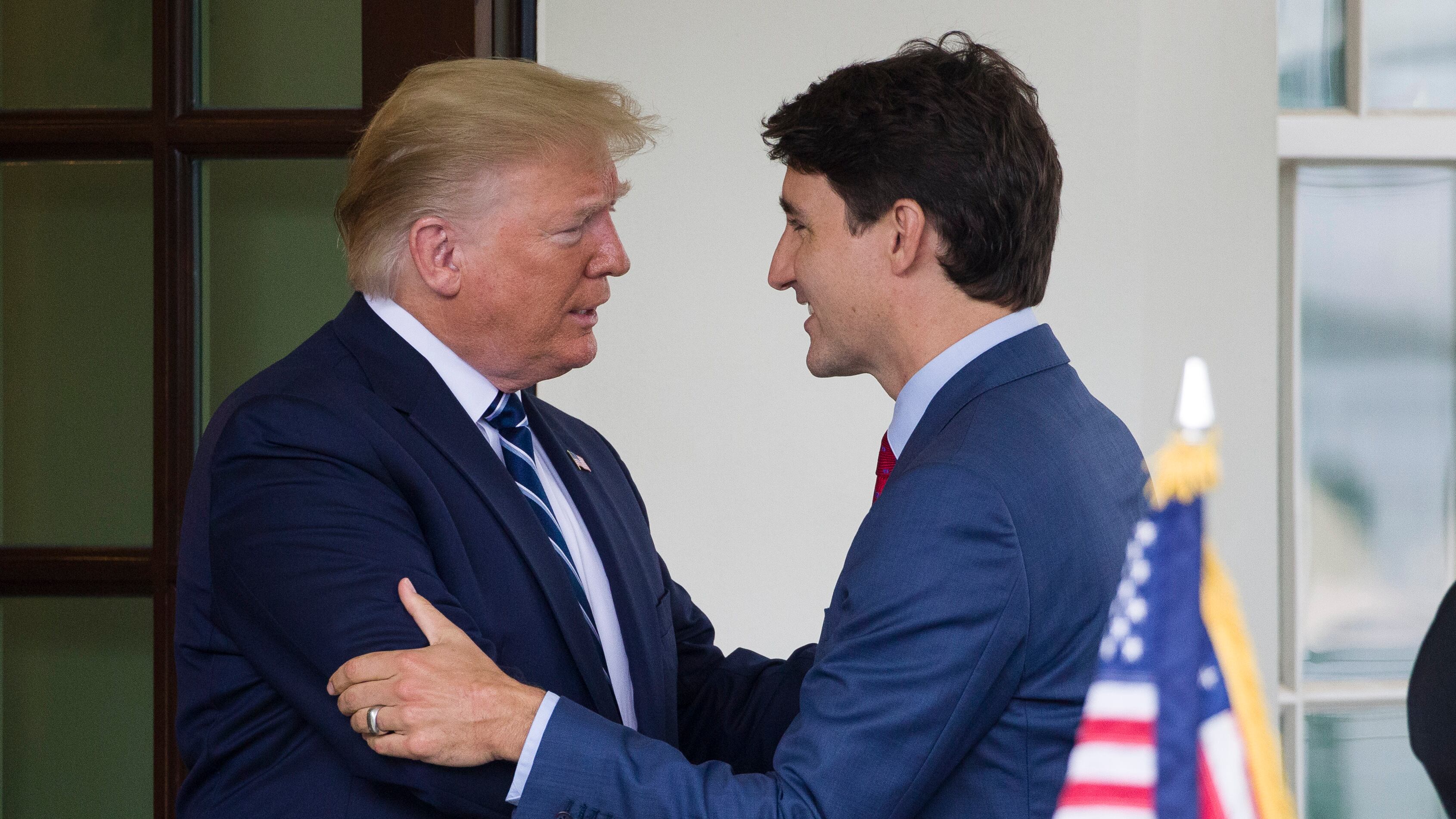The president-elect of the United States, Donald Trump, joked with the Prime Minister of Canada, Justin Trudeau, about a solution for the country to handle the aggressive tariff plan he plans to impose when he takes office in January.
According to the Fox News outlet, Trump suggested to Trudeau that Canada become the 51st state of the United States, in response to the intention to impose a 25% tariff on Canadian imports.
PUBLICIDAD
The meeting took place last week at Trump's estate in Mar-a-Lago in Florida, where Trudeau asked the president-elect not to implement the tax as it would "kill" Canada's economy, reported the American media.
Additionally, they add that in the conversation, Trump told Trudeau that "prime minister" is a better title than "governor" of Canada.
However, Trump assured through his social network "Truth" that the conversation was "very productive."
Trudeau told Trump that tariffs will also harm Americans, according to Canadian minister
Canadian Prime Minister Justin Trudeau told Donald Trump that Americans would also suffer if the president-elect carries out a plan to impose widespread tariffs on Canadian products, said a Canadian minister who attended their recent dinner on Monday.
Trump threatened to impose tariffs on products from Canada and Mexico if they do not stop what he called the influx of drugs and migrants through their borders with the United States. Last week, he posted on his social network that he would impose a 25% tax on all products entering the United States from Canada and Mexico as one of his first executive orders.
The Minister of Public Safety of Canada, Dominic LeBlanc, whose responsibilities include border security, attended a dinner with Trump and Trudeau held at the Mar-a-Lago residence of the former US president on Friday.
Trudeau requested the meeting in an attempt to avoid tariffs by convincing Trump that the northern border is nothing like the United States border with Mexico.
"The Prime Minister, of course, talked about the importance of protecting the Canadian economy and Canadian workers from the tariffs, but we also discussed with our American friends the negative impact that those tariffs could have on their economy, on affordability in the United States," said LeBlanc in Parliament.
If Trump fulfills his threat to impose a 25% tariff on everything imported from Mexico and Canada, the price increases that could follow will clash with his campaign promise to give American families a break from inflation.
Economists pointed out that companies would have few options other than to pass on the additional costs, dramatically increasing prices for food, clothing, cars, alcohol, and other products.
The Association of Product Distributors, a Washington trade group, said last week that tariffs will raise prices of fresh fruits and vegetables and harm American farmers when countries retaliate.
Canada is already considering possible retaliatory tariffs on certain items from the United States if Trump follows through on his threat.
After his dinner with Trump, Trudeau returned home without guarantees that the president-elect would retract his threat to impose tariffs on all products from the United States' main trading partner. Trump stated that the discussions had been "productive," but did not hint at any backtracking on a promise that, according to Canada, unfairly lumps it with Mexico due to the influx of drugs and migrants into the United States.
"The idea that we came back empty-handed is completely false," said LeBlanc. "We had a very productive discussion with Mr. Trump and his future cabinet secretaries... Mr. Trump's commitment to continue working with us was far from being in vain."
At the dinner with Trump and Trudeau were Howard Lutnick, nominated by Trump for Secretary of Commerce; North Dakota Governor Doug Burgum, Trump's choice to lead the Department of the Interior, and Mike Waltz, Trump's pick to be his national security adviser.
Canada's ambassador to the United States, Kirsten Hillman, told The Associated Press on Sunday that "the message that our border is immensely different from the Mexican border was really understood." Hillman, who sat at a table adjacent to Trudeau and Trump, said that Canada is not the problem when it comes to drugs and migrants.
On Monday, the president of Mexico rejected those comments.
“Mexico is respected, especially by our trading partners,” said President Claudia Sheinbaum. She added that Canada has its own issues with fentanyl consumption and that they could only wish to have the cultural richness that Mexico has.
The influx of migrants and drug seizures at the border of the two countries are extremely different. U.S. customs agents seized 19 kilograms (43 pounds) of fentanyl at the Canadian border during the last fiscal year, compared to 9,570 kilograms (21,100 pounds) at the Mexican border.
Most of the fentanyl that reaches the United States, where it causes around 70,000 overdose deaths annually, is manufactured by Mexican drug cartels using chemical precursors trafficked from Asia.
Regarding immigration, the United States Border Patrol reported 1.53 million encounters with migrants at the southwest border with Mexico between October 2023 and September 2024. This is compared to 23,721 encounters at the Canadian border during that period.
Canada is the main export destination for 36 states in the United States. Nearly 3.6 billion Canadian dollars (2.7 billion US dollars) in goods and services cross the border each day. Close to 60% of the crude oil imports to the United States come from Canada, and 85% of the electricity imports as well.
Canada is also the largest foreign supplier of steel, aluminum, and uranium to the United States and has 34 critical minerals and metals that the Pentagon is eager to obtain and invest in for national security.
